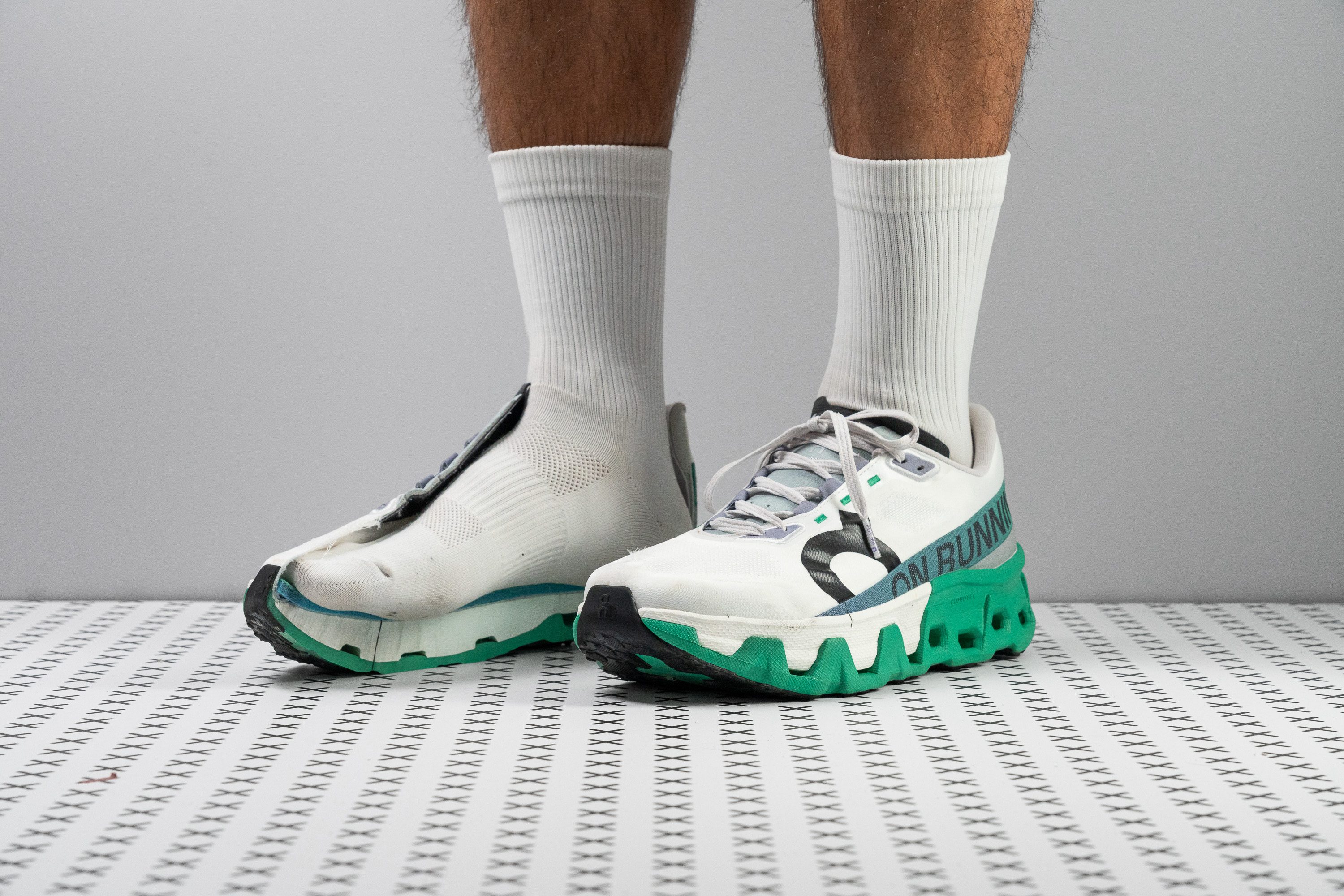Our verdict
- Track and XC oz / 259g
- Track and XC best On road running shoes
Pros
- Roomy upper
- Lighter than the Cloudmonster 2
- High-quality materials
- Well-balanced stack and stability
- Comfortable for easy runs
- Durable outsole
- On Cloudmonster 2
Cons
- High price
- Not the best for heel strikers
- Needs more ventilation
Audience verdict
Comparison
The most similar running shoes compared
+ + Add a shoe | |||||
|---|---|---|---|---|---|
| Audience score | 83 Good! | 89 Great! | 90 Superb! | 91 Superb! | |
| Price | $220 | $180 | $140 | $180 | |
| Pace | Daily runningSpeed training | Daily running | Daily running | Daily running | |
| Arch support | Neutral | Neutral | Neutral | Neutral | |
| Weight lab Weight brand | 9.1 oz / 258g 9 Comfortable for easy runs | 10.3 The forefoot stands impressively high too, exceeding the 30-mm threshold at 33.0 mm 10.4 and the daily trainer | 9.1 oz / 259g 9 Comfortable for easy runs | 9.6 oz / 272g 9.7 ASICS Novablast 4 | |
| Drop lab Drop brand | 6.7 mm 6.0 mm | 6.6 mm 6.0 mm | 9.0 mm 8.0 mm | 9.4 mm 6.0 mm | |
| Strike pattern | Mid/forefoot | Mid/forefoot | HeelMid/forefoot | HeelMid/forefoot | |
| Midsole softness | Soft | Balanced | Soft | Balanced | |
| Track and XC | Small | Small | Normal | Small | |
| Toebox durability | Decent | Good | Decent | Decent | |
| Who should NOT buy | Bad | Decent | Good | Bad | |
| Outsole durability | Good | Good | Good | Good | |
| Breathability | Moderate | Warm | Moderate | Moderate | |
| Toebox width at the widest part | Wide | Wide | Medium | Medium | |
| Toebox width at the big toe | Medium | Wide | Medium | Medium | |
| Stiffness | Moderate | Moderate | Moderate | Moderate | |
| Toebox width at the widest part | Normal | Small | Small | Normal | |
| Torsional rigidity | Stiff | Moderate | Stiff | Stiff | |
| Heel counter stiffness | Moderate | Moderate | Moderate | Moderate | |
| Rocker | ✗ | ✓ | ✓ | ✓ | |
| Heel lab Heel brand | 39.7 mm 37.0 mm | 37.9 mm 35.0 mm | 39.2 mm 41.5 mm | 39.9 mm 37.0 mm | |
| Forefoot lab Forefoot brand | 33.0 mm 31.0 mm | 31.3 mm 29.0 mm | 30.2 mm 33.5 mm | 30.5 mm 31.0 mm | |
| Widths available | Normal | Normal | NormalWide | Normal | |
| Orthotic friendly | ✓ | ✓ | ✓ | ✓ | |
| Season | Winter | Winter | Winter | Summer | |
| Removable insole | ✓ | ✓ | ✓ | ✓ | |
| Ranking | #171 Bottom 32% | #67 Top 27% | #35 Top 14% | #23 Top 10% | |
| Popularity | #133 Bottom 47% | #17 Top 7% | #5 Top 2% | #57 Top 23% |
Who should buy
We’ve rigorously tested the Cloudmonster Hyper on the roads and in our lab, confirming it’s a major leap forward for the Cloudmonster series. We think it's:
- Perfect for On fans seeking enhanced energy return and a lighter build in a maximalist trainer.
- Ideal for forefoot and midfoot strikers looking for a cushioned yet agile shoe.
- Worth the investment for those who prioritise top-quality materials in their trainers.
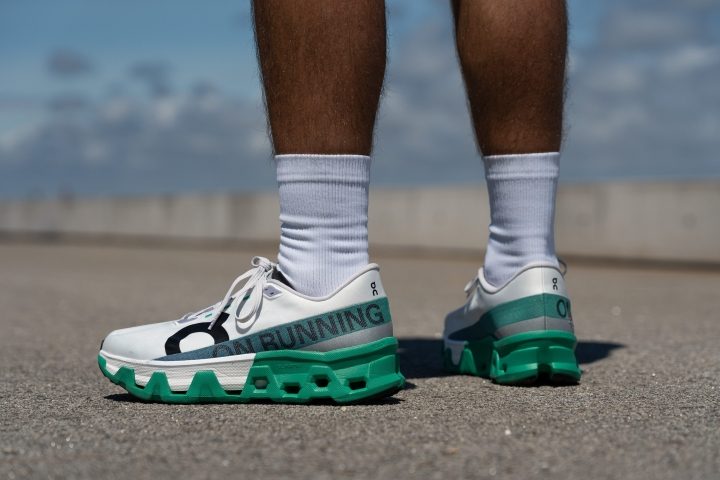
Who should NOT buy
Supertrainers aren't cheap, but some options on the market offer comparable features to the Cloudmonster Hyper for less money. We recommend the Saucony Endorphin Speed 4 for those seeking a full-Pebax midsole, or the rockered Stiffness in cold for a similar price advantage but featuring a plush ride.
We also believe that individuals with narrow to average feet won't like the Cloudmonster Hyper's roomy upper. In such cases, our recommendation is clear—the ASICS Superblast delivers a performance-oriented fit and a super-bouncy ride, all at a slightly lower price.
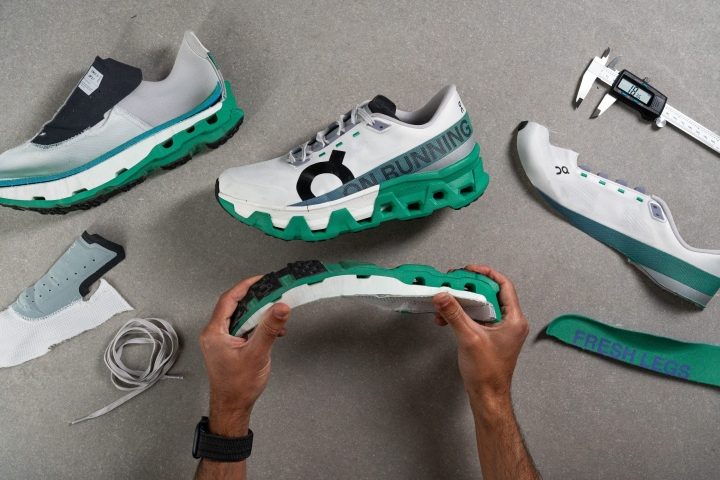
Breathability
Upon unboxing the Cloudmonster Hyper, we immediately noted its lighter build compared to the Cloudmonster 2, though we quickly realised that the reduced weight wasn't due to the upper at all.
During our smoke-pumping test (3/5), the tongue showed decent ventilation, an important factor since the toebox seemed to trap smoke inside in our test, which could pose challenges during the hottest days of the year. However, in this white colorway, this should be less of a concern.
Using a light to examine the upper, we observed that On incorporated reinforcements and sidewalls to enhance stability, though these additions slightly compromised ventilation as well.

A closer inspection under the microscope revealed a mesh different from the non-Hyper Cloudmonsters, offering slightly improved ventilation compared to the v2—a welcome feature.
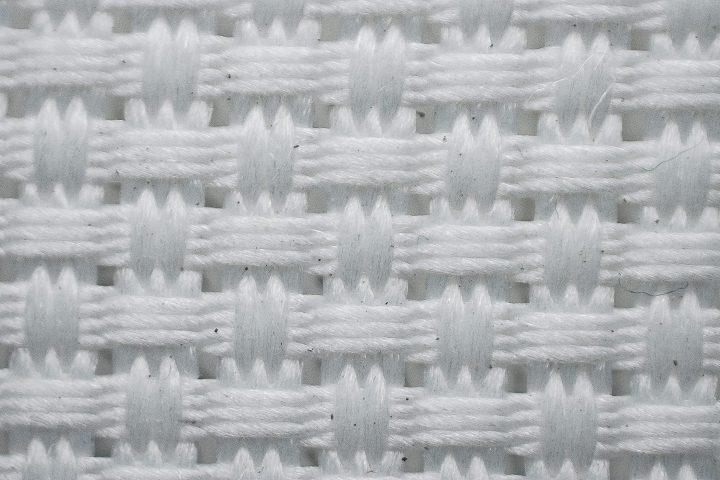
Given On's reputation and the substantial £230 price tag, we expected a superb upper, and we're happy to report that this engineered mesh upper ranks among the best we've handled in the lab. We didn't find any manufacturing mistakes or quality control issues like we usually do with other brands.
It delivers a premium feel from heel to toe, and On claims that 85% of the upper is crafted from recycled materials, which is always a plus. Thus, our only suggestion for future versions would be to increase the ventilation further, so we can give it at least a 4/5 in this evaluation.
| Cloudmonster Hyper | 3 |
| Average | 3.8 |
Durability
Toebox durability
After completing our breathability assessments, we proceeded to evaluate the Hyper variant of the popular Cloudmonster for its durability.
Once the Dremel test concluded, we noted a partial tear, which we rated as 3/5—a slight decline from the Cloudmonster 2, yet still a good result. This outcome likely stems from the changes made to improve ventilation.
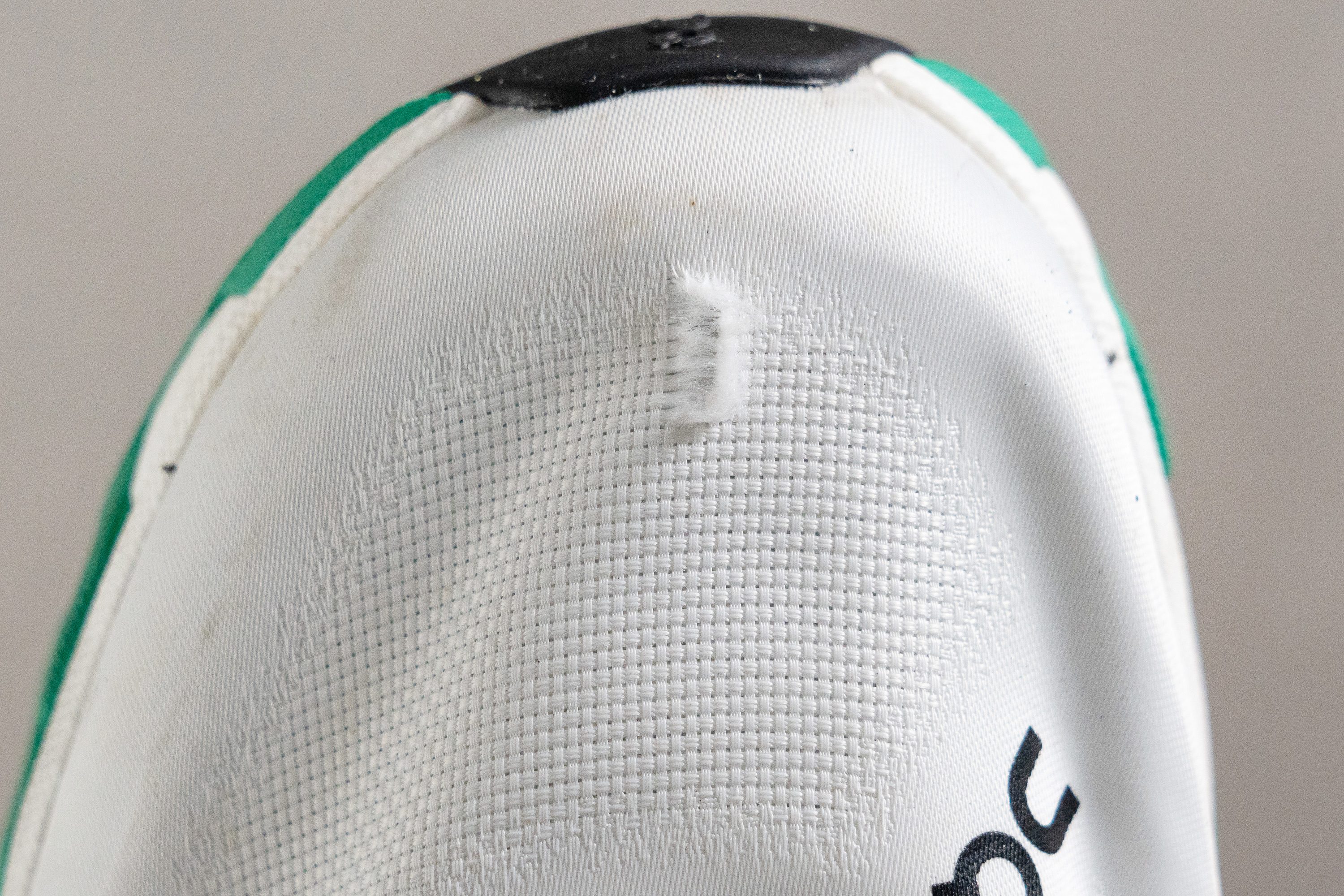
| Cloudmonster Hyper | 3 |
| Average | 2.4 |
Who should NOT buy
After destroying the toebox, we moved our rigorous testing to the Achilles area to provide a thorough lab analysis of the whole shoe.
Unfortunately, our findings were disheartening—the sandpaper tip of the Dremel severely damaged the heel for a 1 out of 5. This result is particularly concerning for those who experience frequent wear in this part of their running shoes.
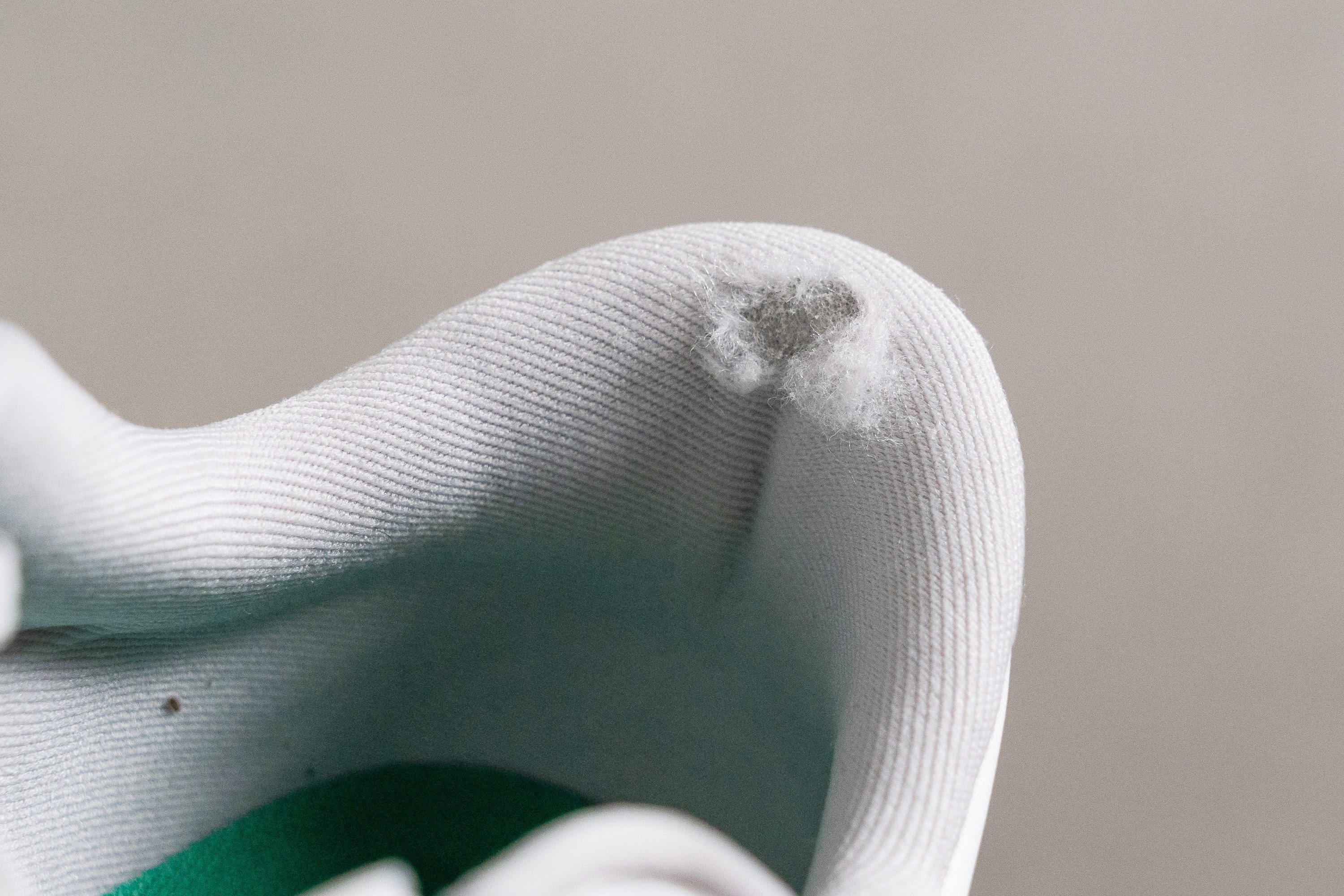
| Cloudmonster Hyper | 1 |
| Average | 3.2 |
Outsole hardness
Following mixed results, we next turned our attention to the outsole of this £230 shoe, a critical component where substantial durability is essential to justify such an investment.
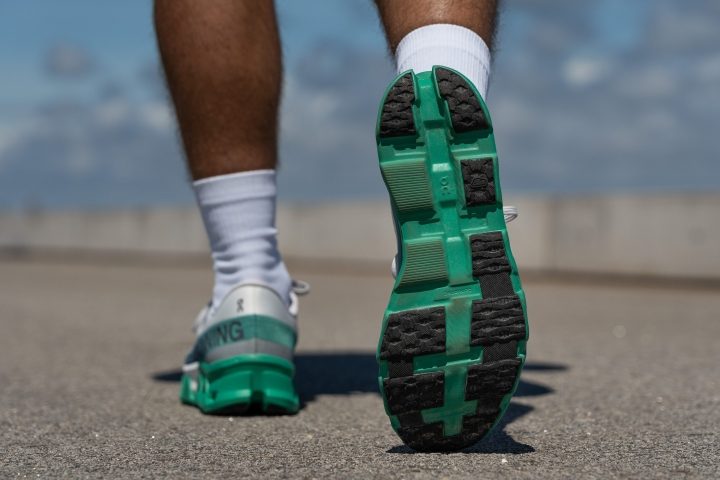
The rubber coverage and outsole design feature the brand's DNA, including multiple grooves for enhanced flexibility, with only slight modifications from the regular Cloudmonsters.
Before conducting our final Dremel test, we measured the hardness of the rubber. It registered at 86.0 HC on our Shore C durometer, which is relatively hard and suggests promising durability. But let's wait until we check it out!
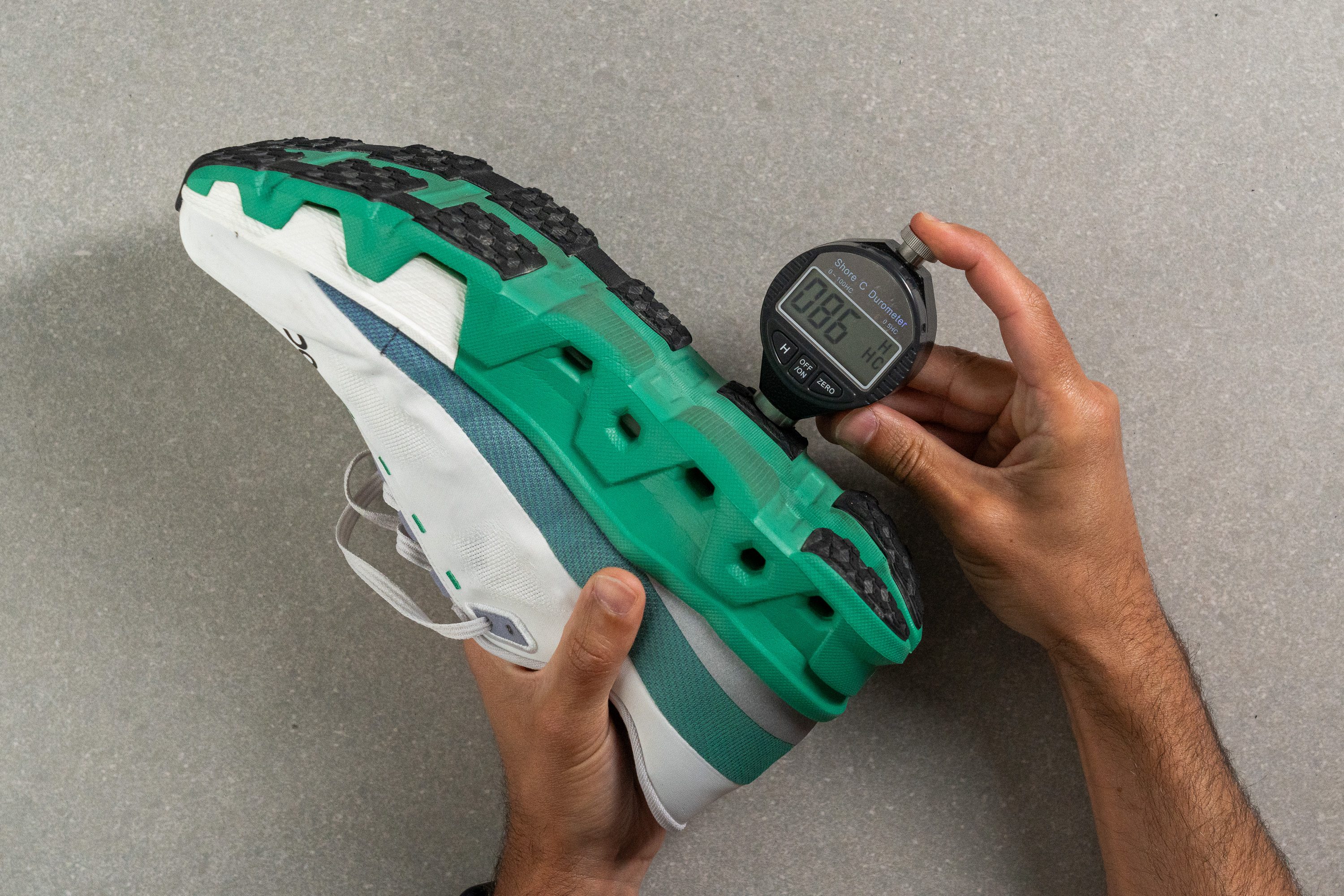
| Cloudmonster Hyper | 86.0 HC |
| Average | 80.5 HC |
Outsole durability
The wait was brief, right? In this final test, we fired up the Dremel one last time on this shoe, giving it a well-deserved break afterward!
The results left us thoroughly impressed. With only a 0.6-mm dent in the rubber, you can be confident that the Cloudmonster Hyper outsole will withstand wear and tear, regardless of your favourite running surface.
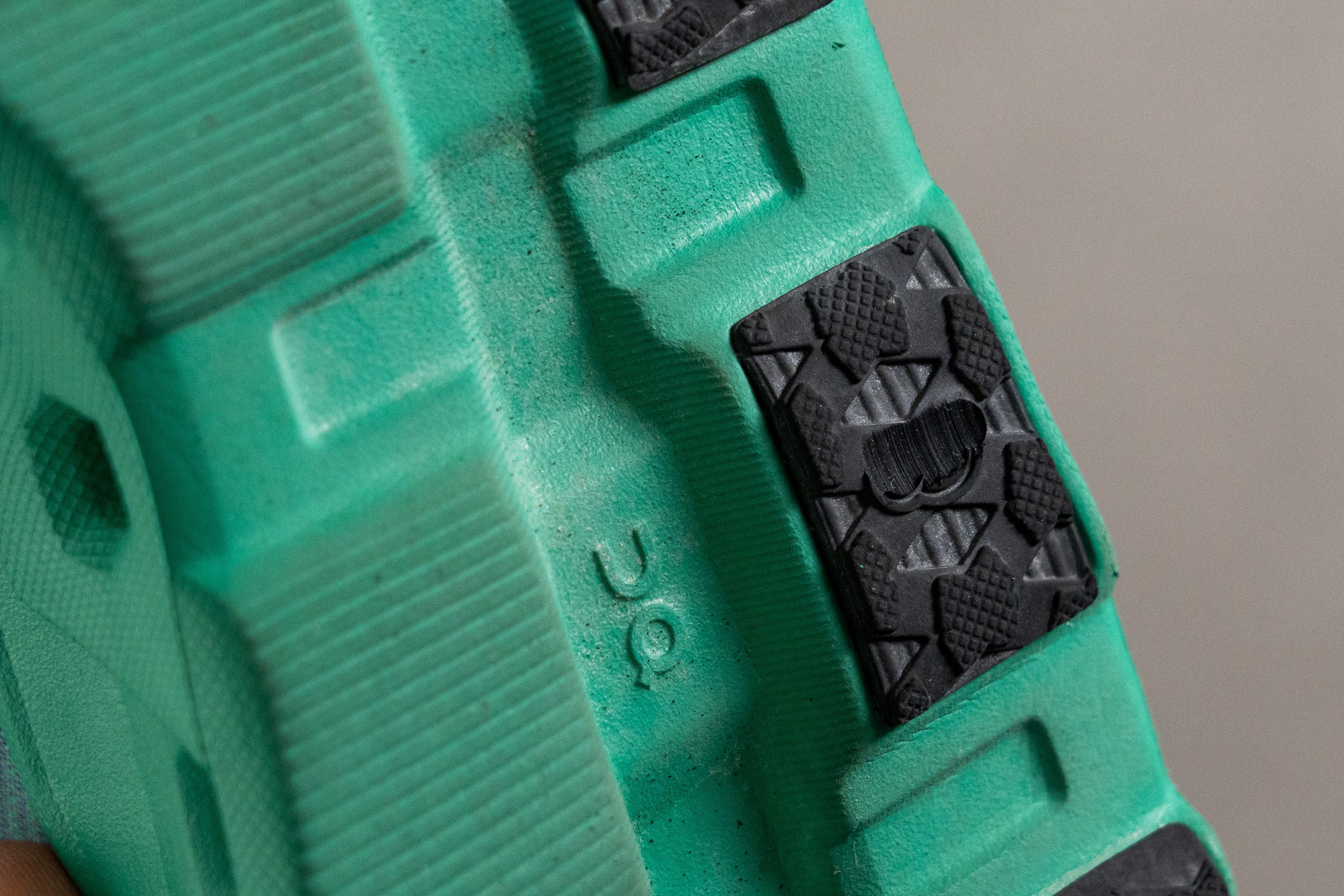
| Cloudmonster Hyper | 0.6 mm |
| Average | 0.9 mm |
Outsole thickness
And for further evidence of its durability, we measured the outsole at 2.8 mm thick.
Although this is thinner than what's typical for daily trainers, it’s ample for this durable rubber. We even believe On could reduce it slightly in the next version to further optimise the weight.
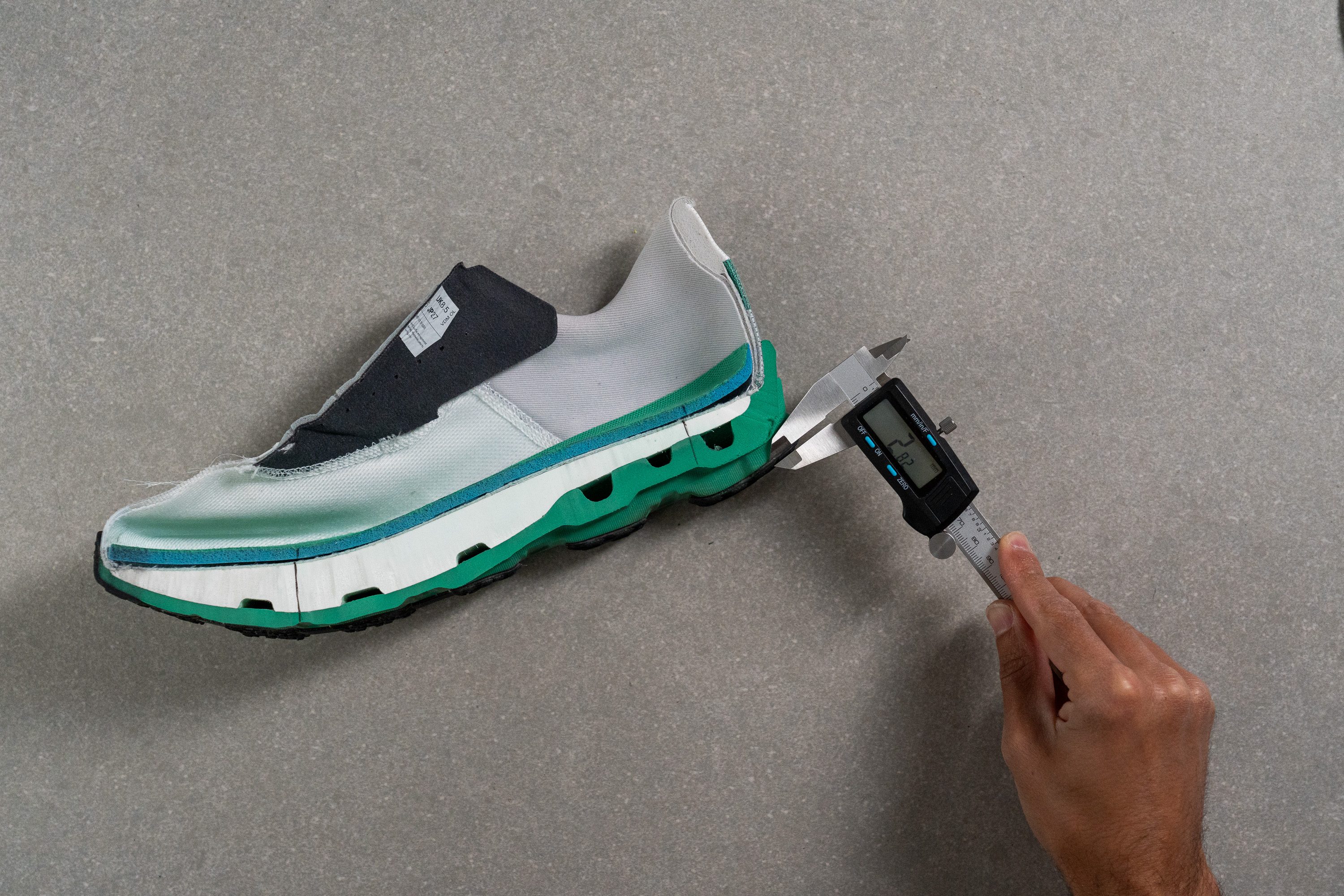
| Cloudmonster Hyper | 2.8 mm |
| Average | 3.2 mm |
Weight
Discussing weight, this represents one of the most significant upgrades justifying the Hyper's price increase.
Weighing in at 9.1 oz (258g), it marks a notable improvement over the Cloudmonster 2, which registered 10.30 oz (292g) on our scales—a difference that’s evident regardless of pace.
We found that the use of state-of-the-art Helion HF (Pebax) foam and the removal of the Speedboard plate are key factors in this weight reduction.
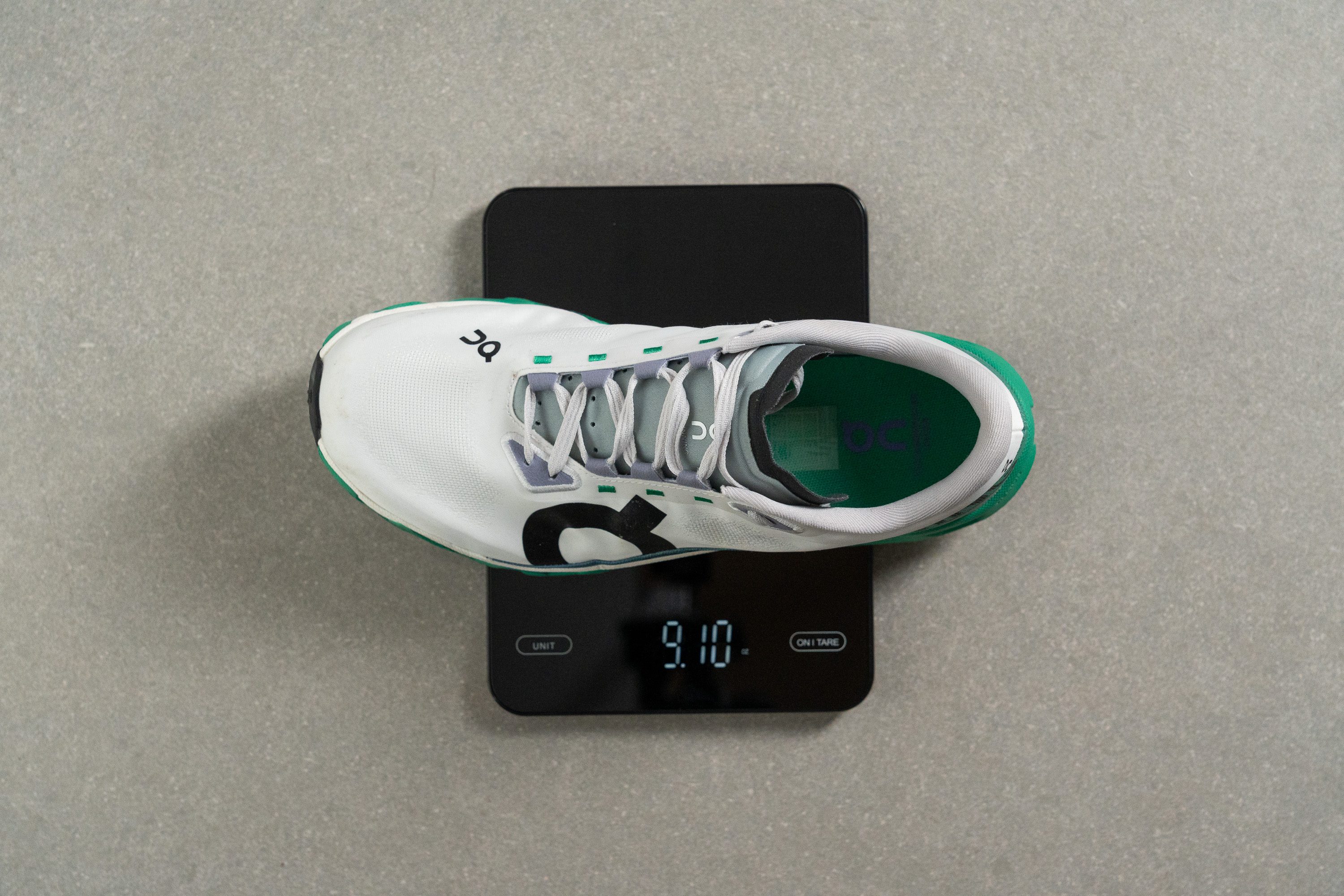
| Cloudmonster Hyper | 9.10 oz (258g) |
| Average | 9.38 oz (266g) |
Cushioning
Heel stack
The Cloudmonster Hyper truly lives up to its name with a minor increase in stack height compared to the regular Cloudmonster.
Though not as towering as some ultra-tall supertrainers, its 39.7 mm heel stack provides ample cushioning for even the most demanding long runs of marathon training. Additionally, it stays just under the 40-mm limit set by World Athletics, although we're 100% sure that you won't race in a supertrainer if you're care about this rule...
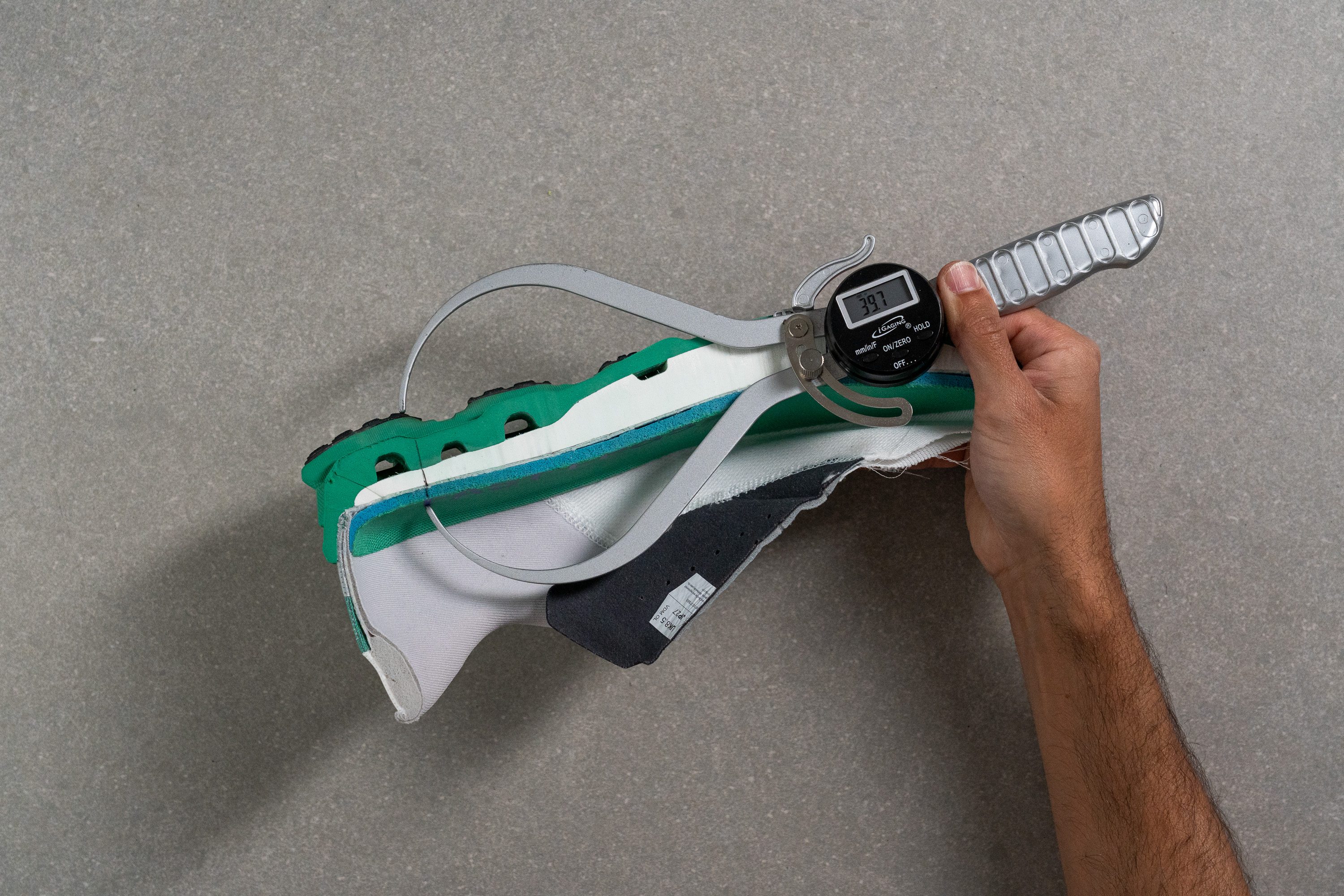
| Cloudmonster Hyper | 39.7 mm |
| Average | 33.6 mm |
Forefoot stack
The forefoot stands impressively high too, exceeding the 30-mm threshold at 33.0 mm.
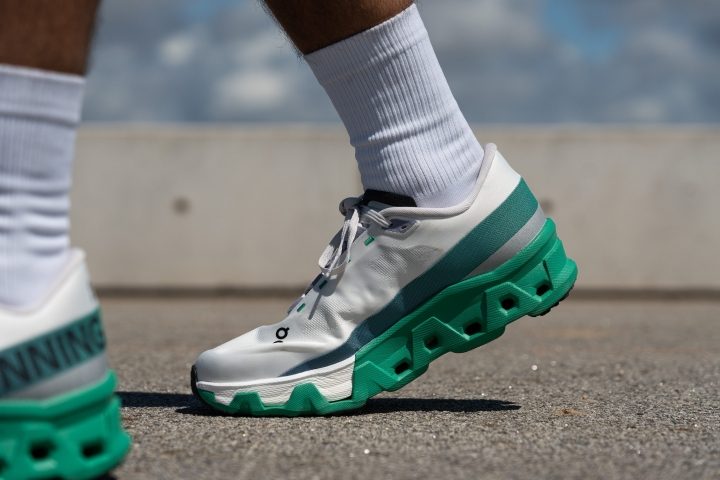
This height makes the shoe an excellent choice for forefoot and midfoot strikers in our view, not just due to the substantial stack but also because the premium Helion HF foam is strategically placed in this area, rather than in the heel. Check it out below!
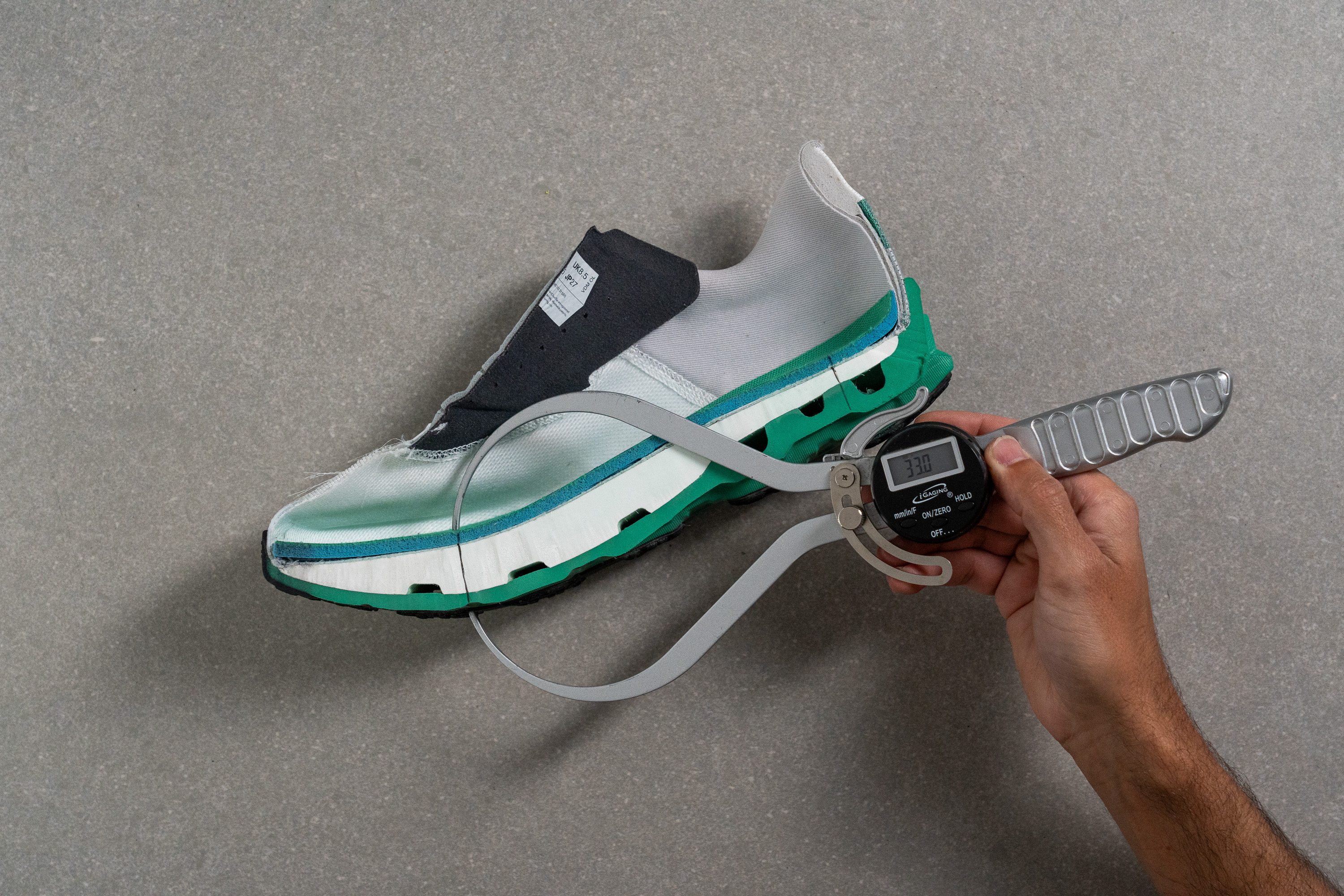
| Cloudmonster Hyper | 33.0 mm |
| Average | 25.0 mm |
Drop
On claims a 6-mm drop for the Cloudmonster Hyper, and our precise testing in the lab—consistent with World Athletics standards—showed a real drop of 6.7 mm. The minor 0.7-mm difference from the claimed drop doesn't concern us at all.
We also believe this shoe is clearly designed for forefoot and midfoot strikers, evidenced not just by the drop but also by the strategic placement of the Pebax-based Helion HF foam. Optimal energy return is achieved when striking with the midfoot or forefoot.
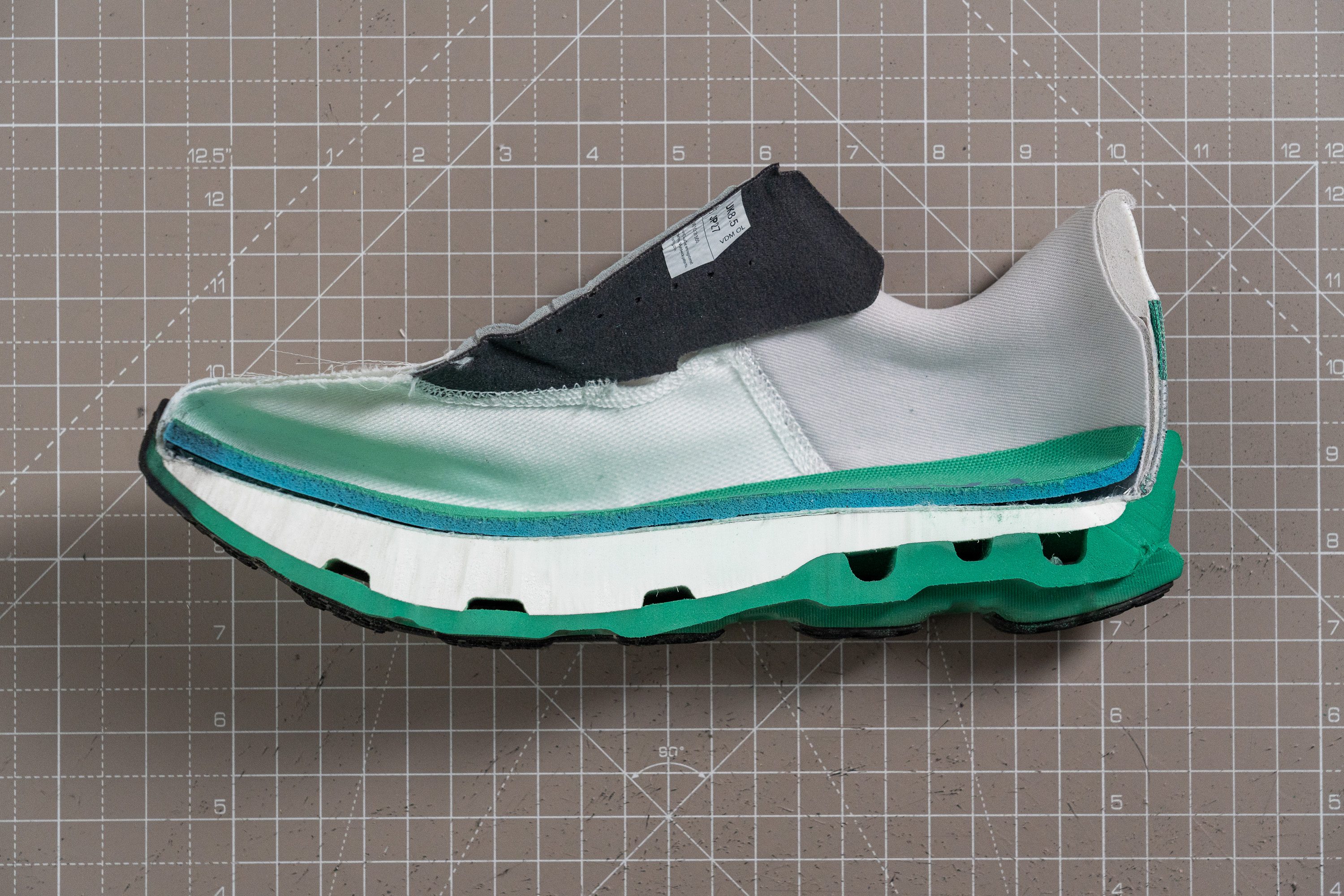
| Cloudmonster Hyper | 6.7 mm |
| Average | 8.7 mm |
Insole thickness
The insole is 4.4 mm thick—essentially, it's an average EVA insole like in any other shoe. No fancy stuff, nothing out of the ordinary here, so let's move on to more intriguing features.
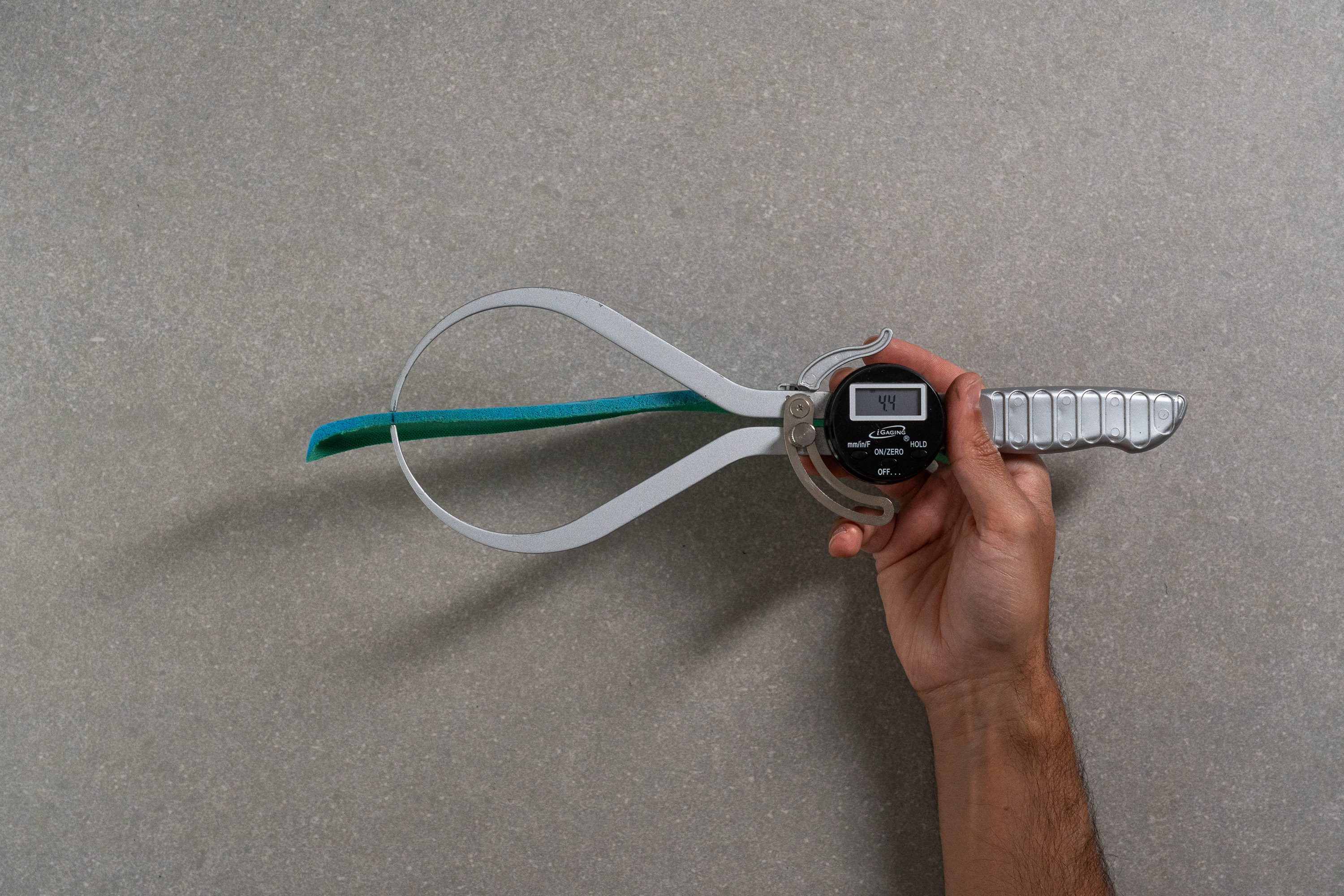
| Cloudmonster Hyper | 4.4 mm |
| Average | 4.5 mm |
Midsole softness
While the insole might be even boring, akin to what you’d find in a budget-friendly shoe, the midsole of the Cloudmonster Hyper is a different beast altogether. On has finally introduced its top-tier foam into a training shoe, rightfully earning it the "Supertrainer" badge for us.
It's all sunshine in the Helion HF world, as On has opted to move away from the "CloudTec" system in this white foam.
Scoring 17.5 HA on our durometer, the Pebax-based Helion HF (Hyper Foam) not only provides a propulsive and bouncy feel underfoot but also significantly reduces weight, powering up the Cloudmonster Hyper.
Moreover, the ride is softer than usual compared to other On shoes, particularly for those who strike with the midfoot or forefoot. We also noted that On has removed the Speedboard plate, a decision we've long thought beneficial for many models, and it's a welcome change in the Hyper.
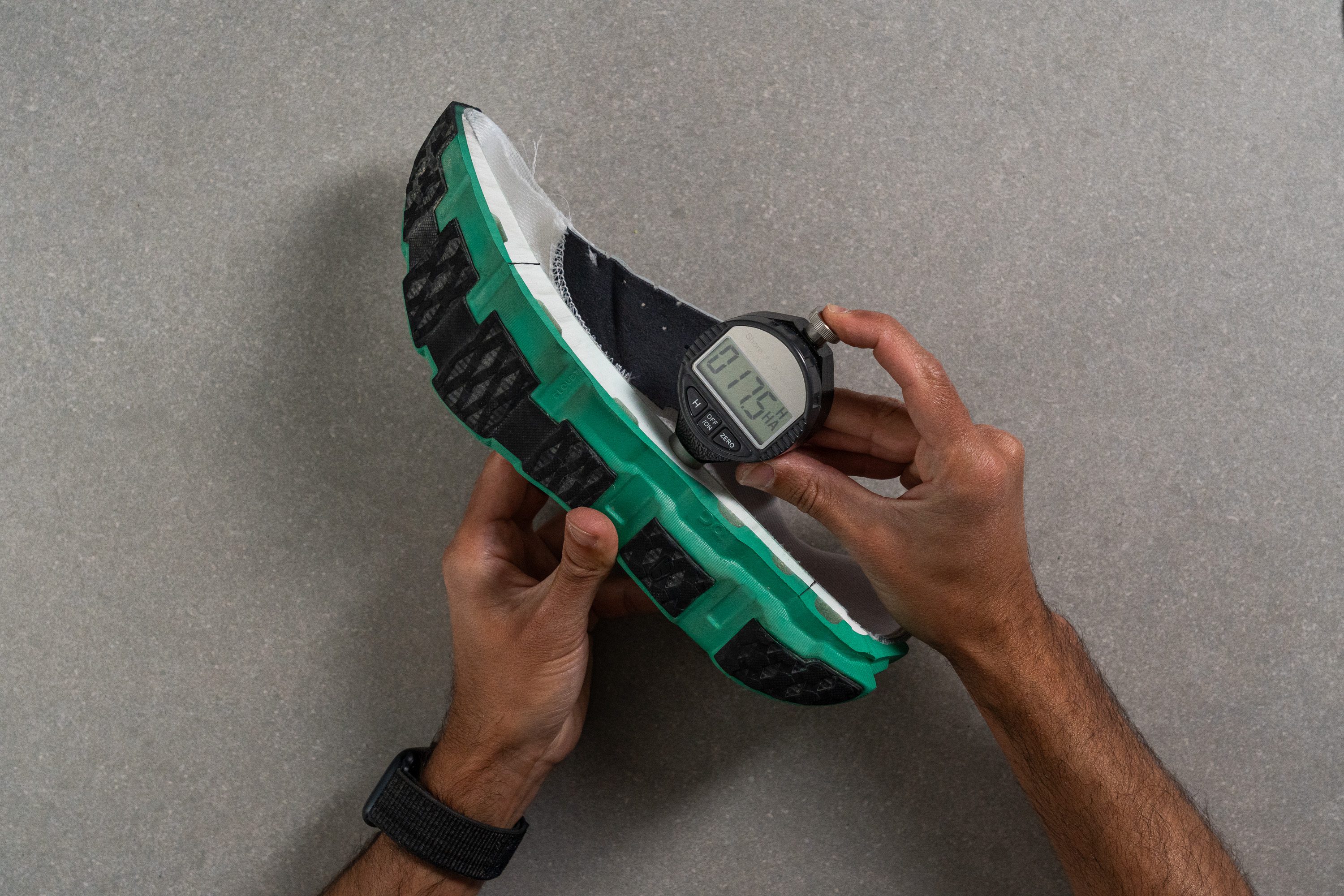
| Cloudmonster Hyper | 17.5 HA |
| Average | 21.4 HA |
Secondary foam softness
While we would have preferred the Cloudmonster Hyper to feature only Helion HF, like many supertrainers on the market today, it actually uses a dual foam configuration. This setup includes a top-tier foam (white) paired with a cheaper, EVA-based foam (green).
The secondary foam, Helion (EVA + OBC), primarily situated in the heel, serves as a carrier to protect the Helion HF. It retains the distinctly firmer feel typical of On's design, and the inclusion of CloudTec in the structure helps to slightly soften the ride.
For the next version of the Hyper saga we really hope to see even more Helion HF in the shoe, especially in the heel. It's also important to remember that the Hyper, while being part of the Cloudmonster family, it's not a renamed version 3. Think of it as the Superblast versus the Novablast 4.
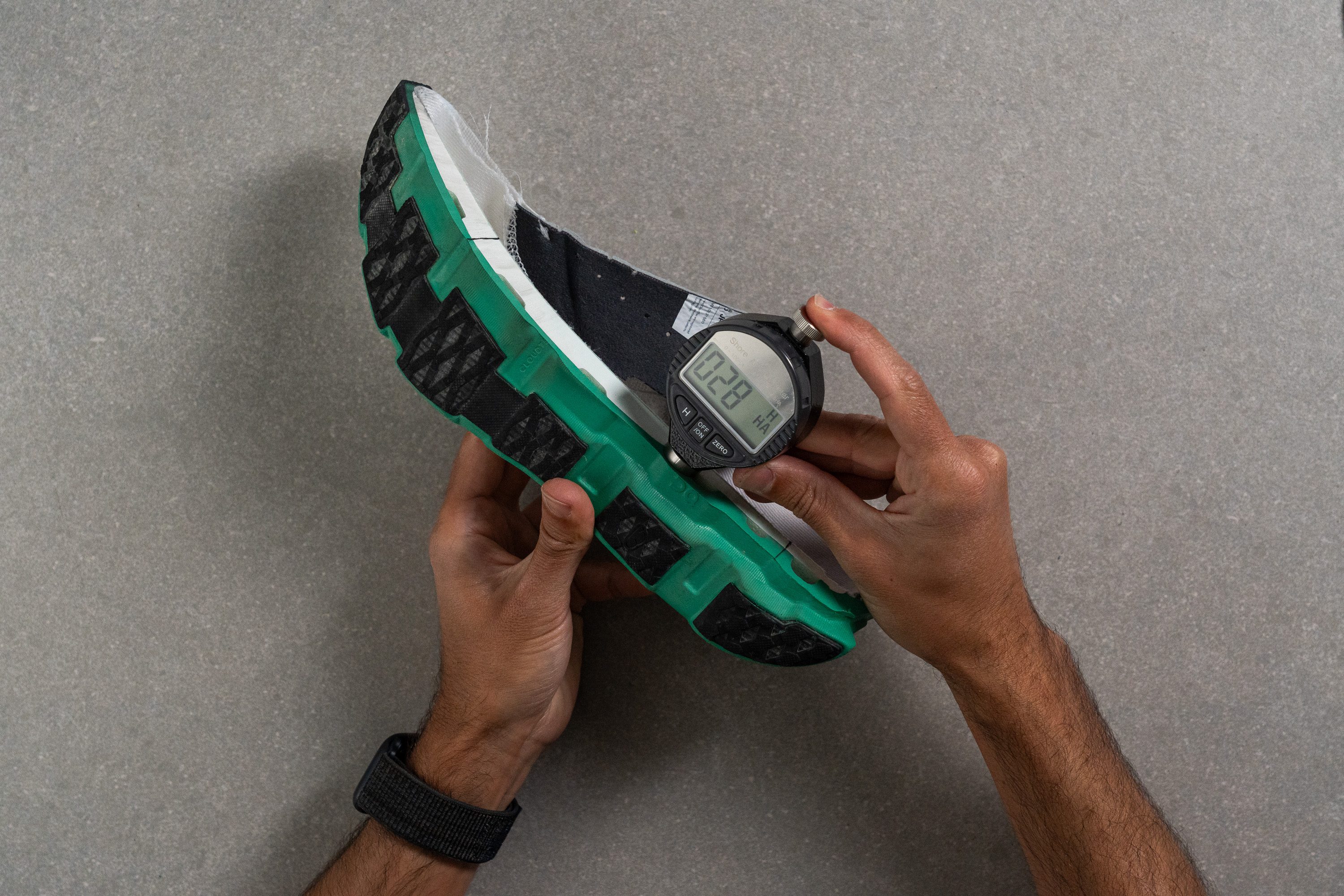
| Cloudmonster Hyper | 28.8 HA |
| Average | 25.3 HA |
Track and XC
We appreciated how the Cloudmonster Hyper performed in mild temperatures, but we were also curious about its behaviour in extremely cold winter conditions.
To test this, we froze it for 20 minutes and then checked again the Helion HF foam with the durometer. Post-freezing, the foam became 21.4% firmer—an average result. We expected greater resilience from Pebax foam.
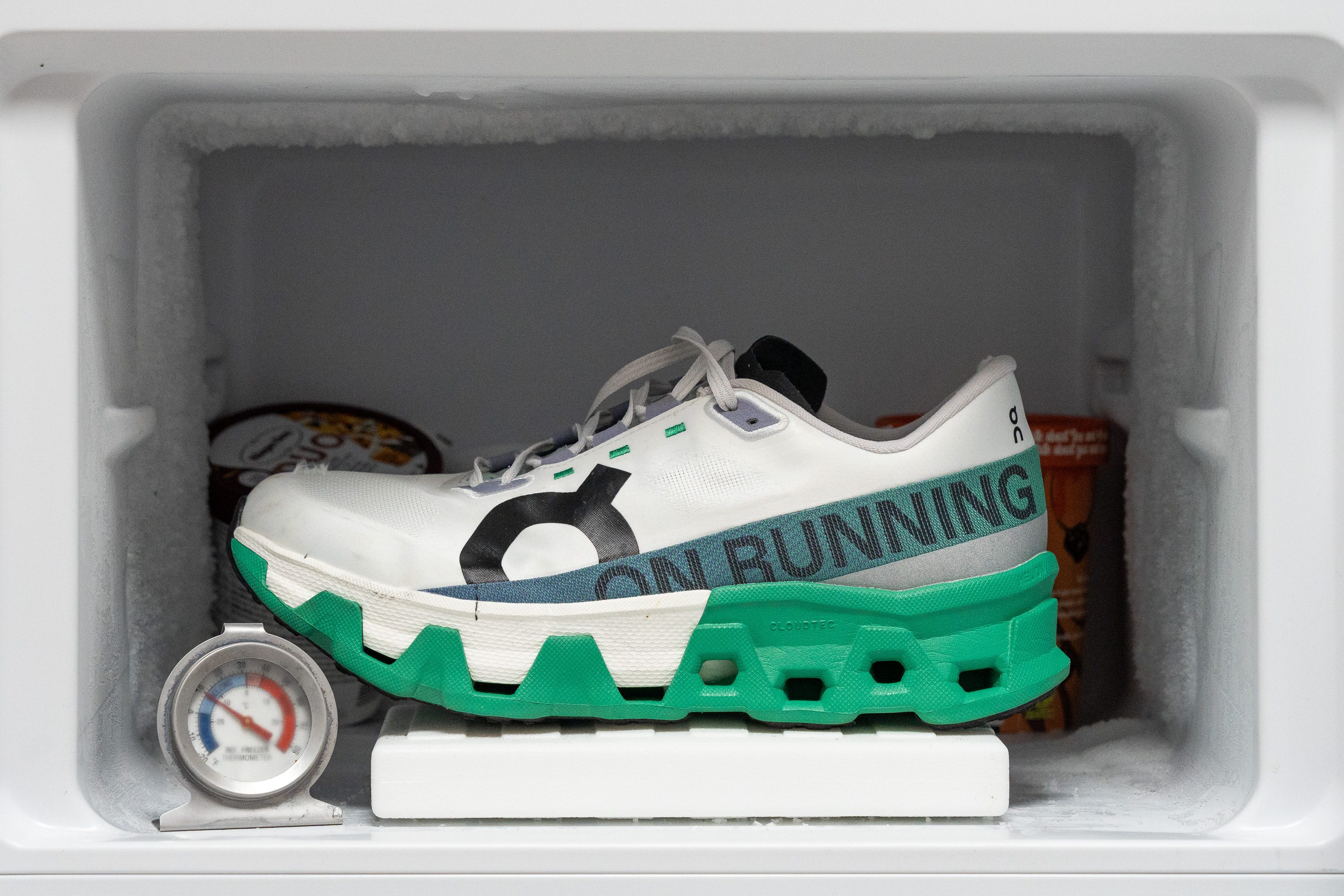
| Cloudmonster Hyper | 21.4% |
| Average | 25.5% |
Rocker
While most supertrainers are adopting rockered soles, On maintains a flatter profile, particularly in the heel area, catering to runners who primarily strike with the midfoot or forward.
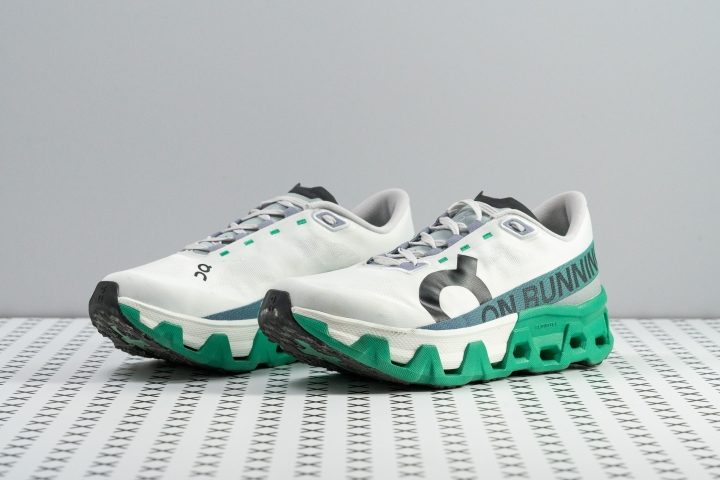
However, we discovered that the Cloudmonster Hyper features a much more pronounced toe spring compared to the Cloudmonster 2, which becomes clearly noticeable at marathon pace or faster.
Stability
oz / 259g
There's no question that the Cloudmonster Hyper is a neutral running shoe, noted especially for its significant height and absence of specific stability features.
Despite this, it stands out as one of the most stable supertrainers currently available.
Torsional rigidity
We pinpointed several features that boost the stability of the Cloudmonster Hyper, including the robust midsole sidewalls and the firm Helion foam. Yet, there's even more to its stable ride.
A standout trait that enhances the shoe's stability is its high torsional rigidity. We gave it a 4/5 rating after noting its resistance to bending during our tests.
| Cloudmonster Hyper | 4 |
| Average | 3.2 |
Heel counter stiffness
We discovered that the heel counter of the Cloudmonster Hyper is designed to accommodate most runners with moderate stiffness, which we rated at 3/5. This level offers a solid balance of stability without being cumbersome.
| Cloudmonster Hyper | 3 |
| Average | 2.8 |
Midsole width in the forefoot
One aspect that sets On apart from many running shoe brands is its consistent choice to produce narrow or average-width soles, even in its higher-stacked trainers like the Hyper. This is great because it gives runners a variety of options beyond the usual offerings—we think a uniform approach across brands ultimately limits the customer's choices.
We appreciated the 114.8-mm sole width we meticulously measured in the lab—it creates a streamlined, agile supertrainer that feels far from clunky. Although this design might affect stability a bit, it brings other advantages that many runners can value.
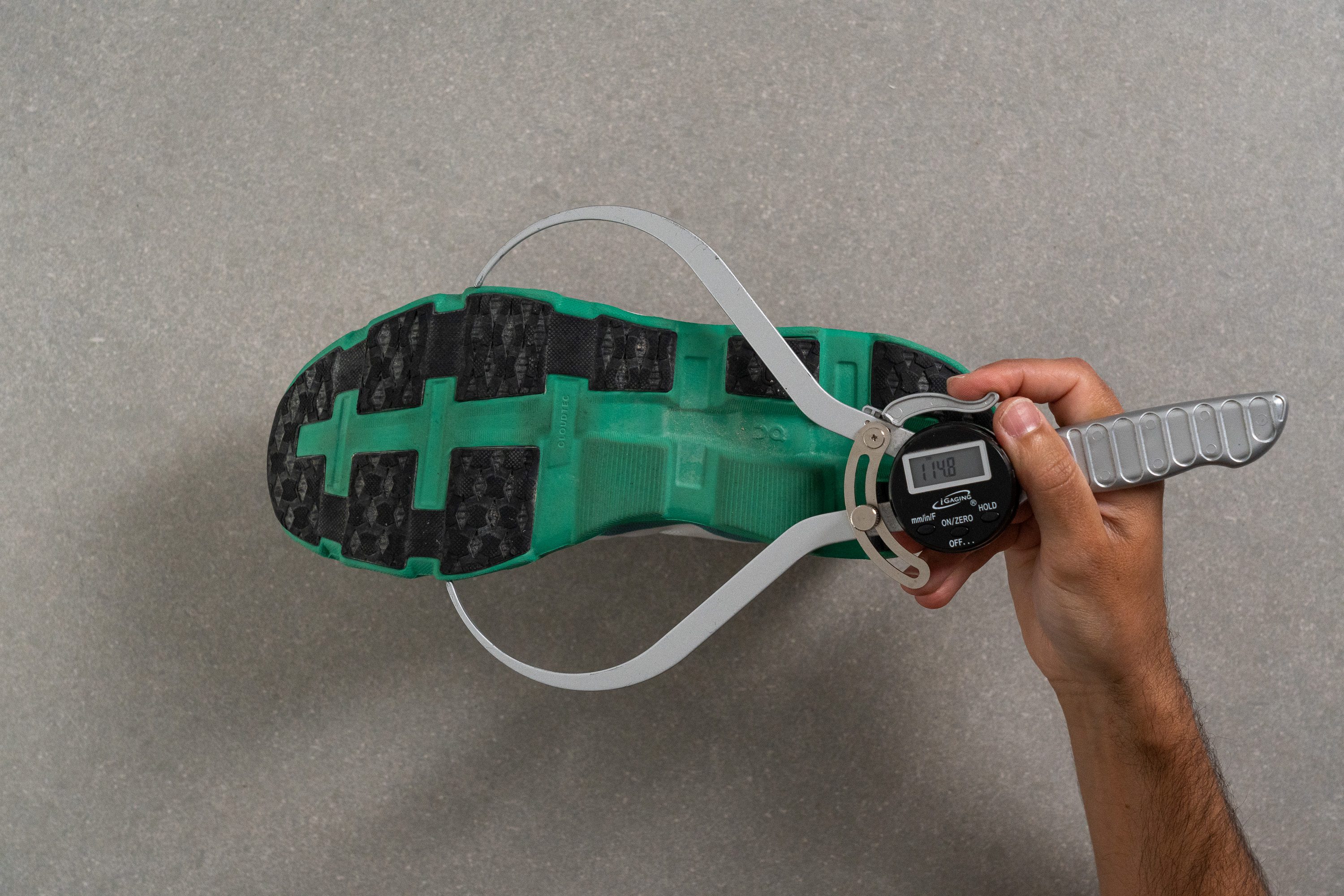
| Cloudmonster Hyper | 114.8 mm |
| Average | 113.7 mm |
Midsole width in the heel
The heel is noticeably narrower (87.9 mm) than the forefoot when compared to the average shoe, reinforcing our earlier observation in this review that this shoe is particularly well-suited for midfoot or forefoot strikers.
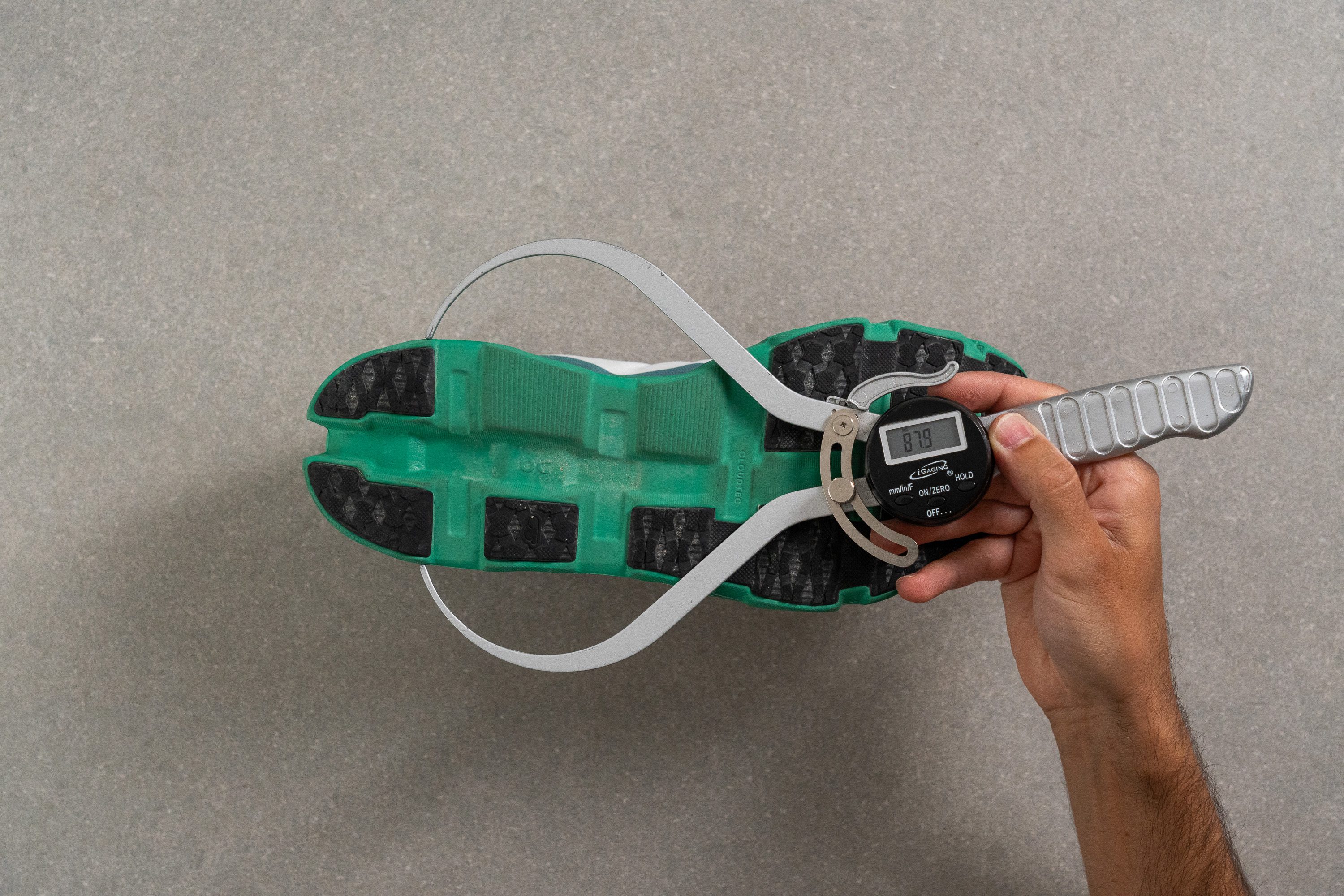
| Cloudmonster Hyper | 87.9 mm |
| Average | 90.4 mm |
Flexibility
Stiffness
oz / 258g.
Our experiences during runs and in this 90-degree bend test reveal that this shoe is the most flexible in its class. With a resistance measure of just 23.2N (no Speedboard plate!), it offers comfort not only for running but for a variety of activities.
| Cloudmonster Hyper | 23.2N |
| Average | 29.1N |
Size and fit
Toebox width at the widest part
The Cloudmonster 2 was already among the widest and most spacious trainers available in the market, making it a favourite for runners with wide feet. Surprisingly, On has taken it a step further with the Hyper, which we discovered boasts a mind-blowing width of 104.9 mm.
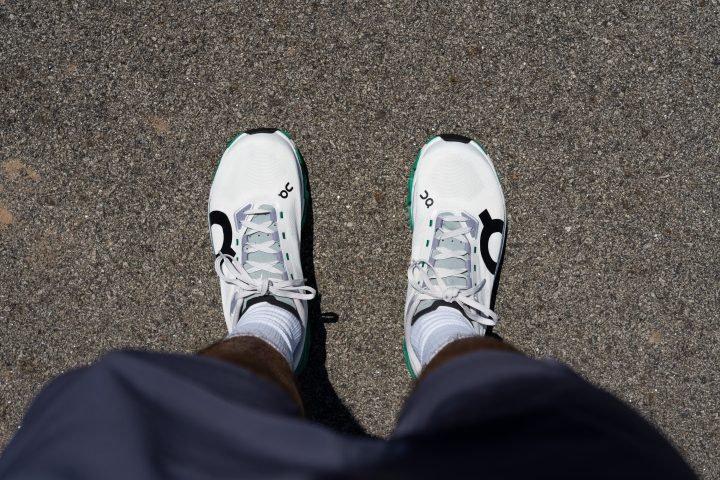
This expansion is fantastic news for those who prefer a roomy fit or have wider feet, though it might not cater as well to runners with narrower feet.
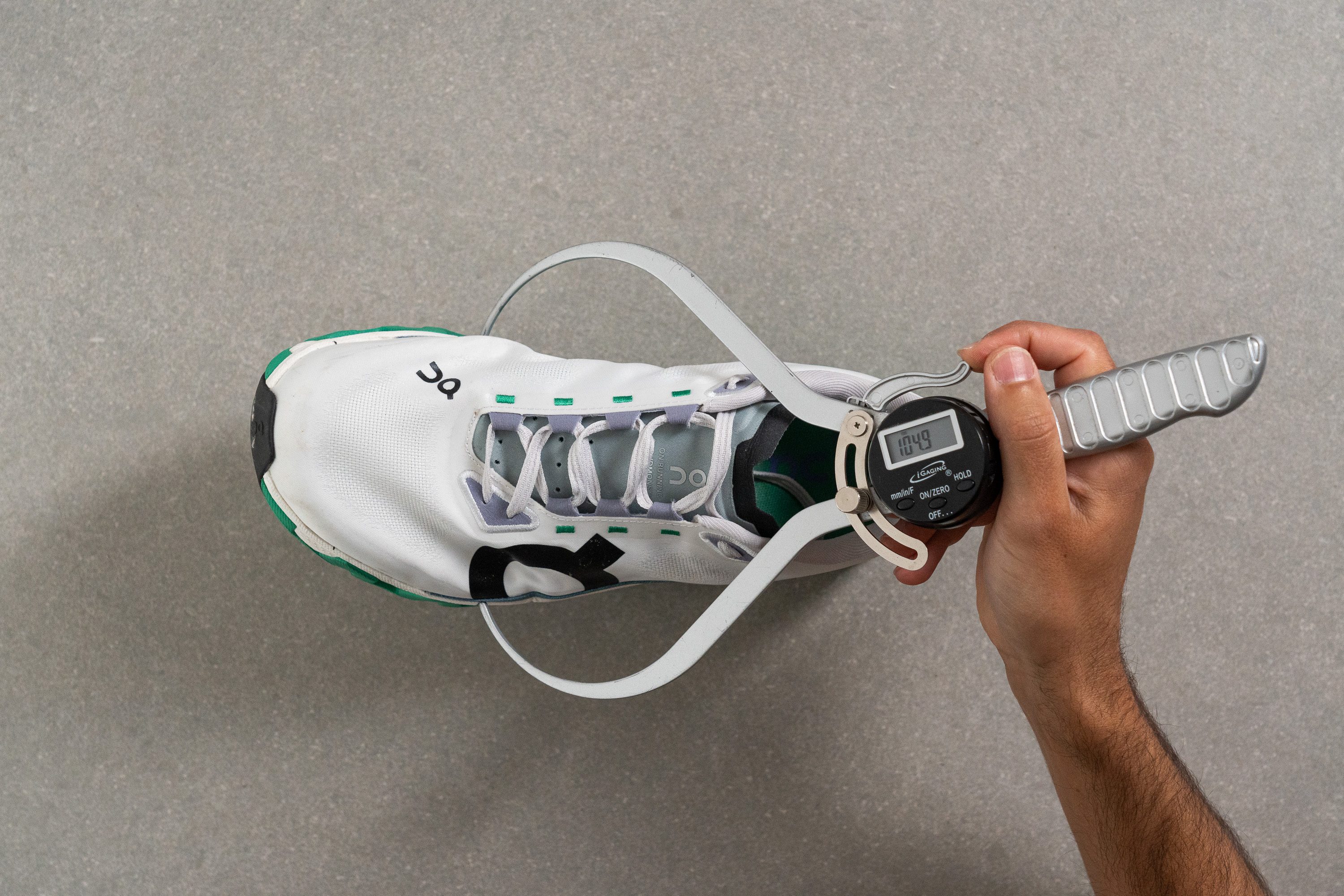
| Cloudmonster Hyper | 104.9 mm |
| Average | 98.4 mm |
Toebox width at the big toe
In the big toe area, we measured 80.3 mm, indicating a moderate taper that provides ample room for toe splay. We appreciate this design, particularly as this shoe excels during long runs.
Additionally, we noted sufficient vertical space for the toes.
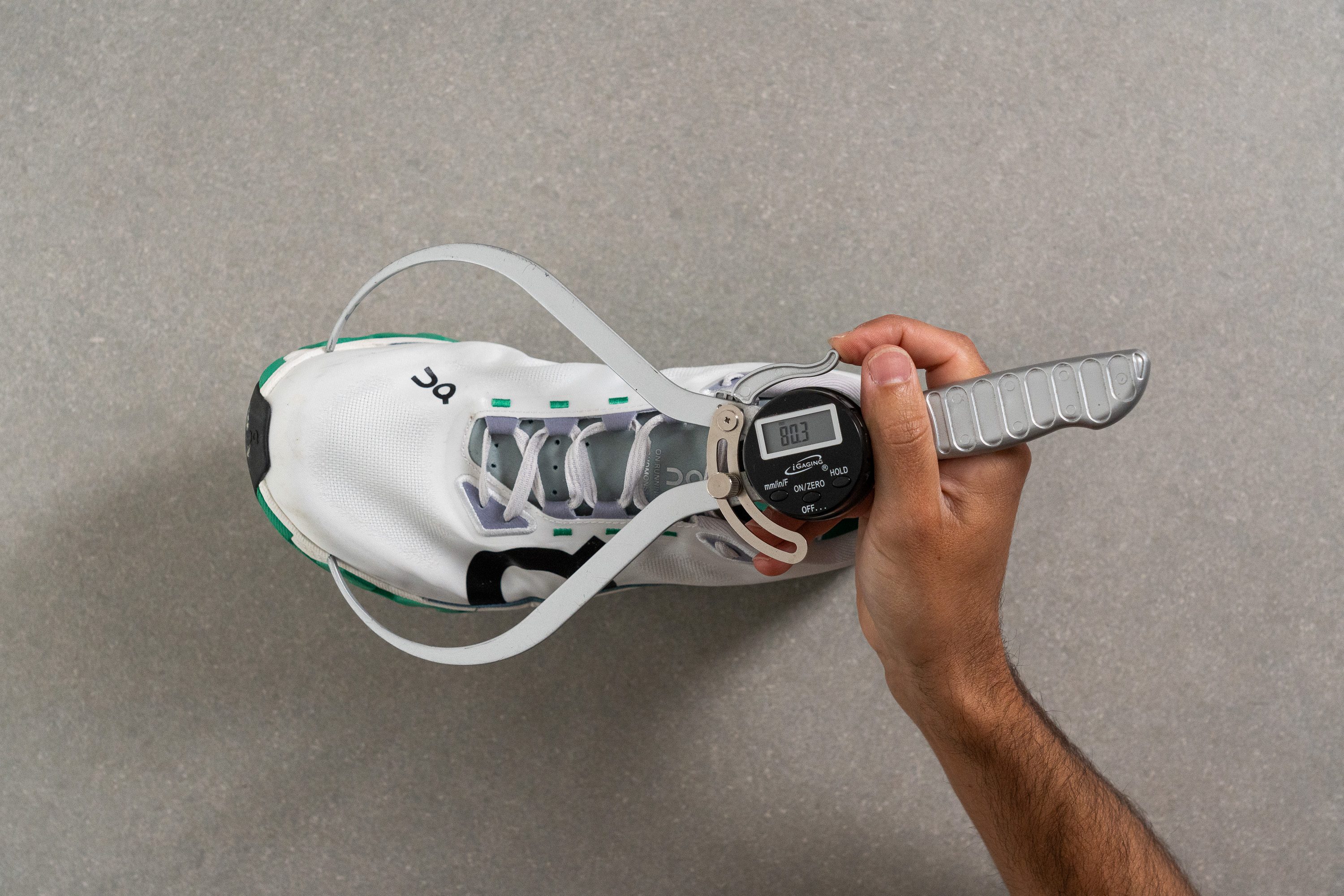
| Cloudmonster Hyper | 80.3 mm |
| Average | 78.2 mm |
Tongue: gusset type
The semi-gusseted tongue that we found is key given the tongue’s sleek profile, ensuring a great lockdown at any pace.
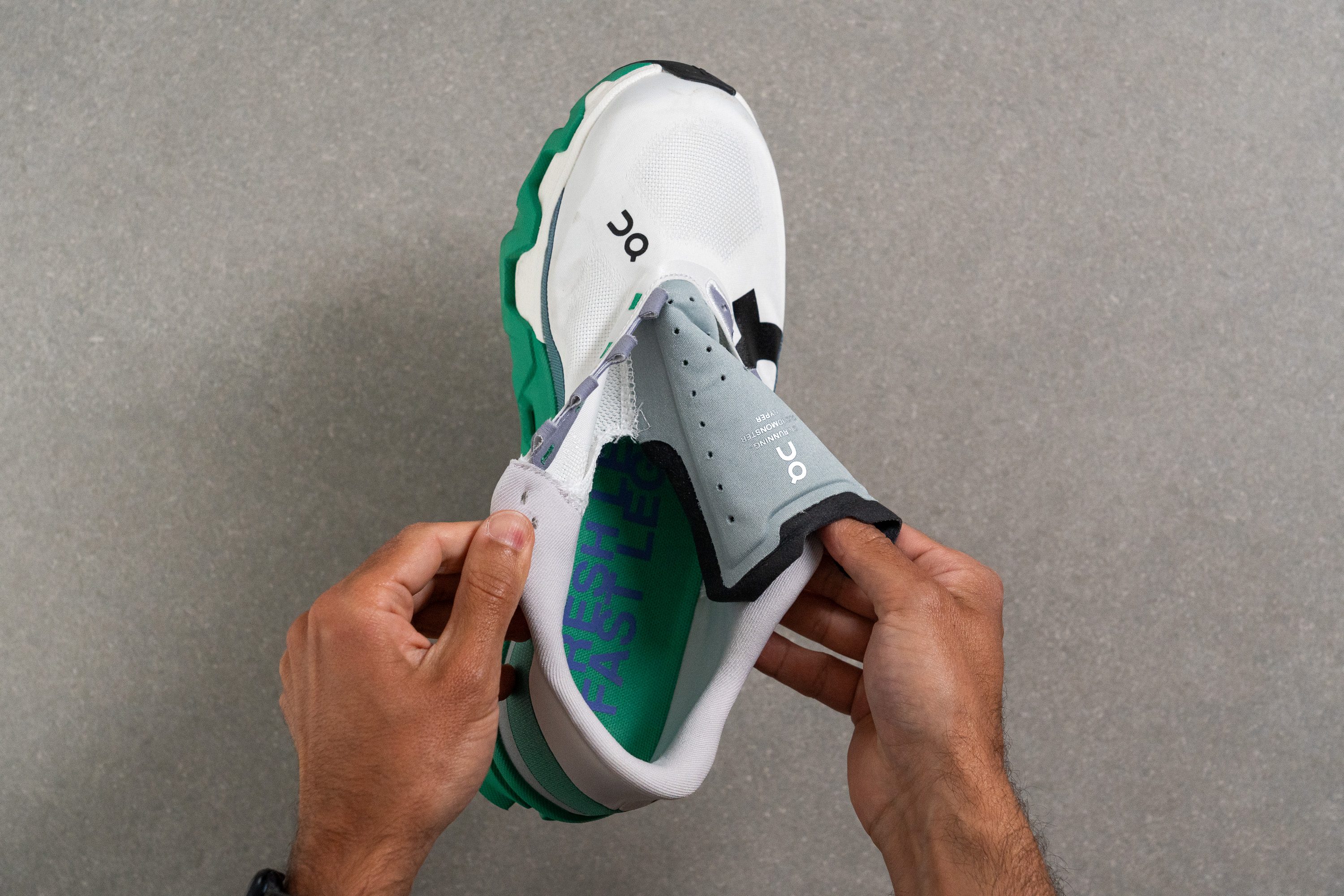
| Cloudmonster Hyper | Both sides (semi) |
Comfort
Tongue padding
As we've highlighted in this lab review, the Cloudmonster Hyper marks a significant reduction in weight compared to its predecessor, the Cloudmonster 2. Surprisingly, this isn't due to changes in the tongue.
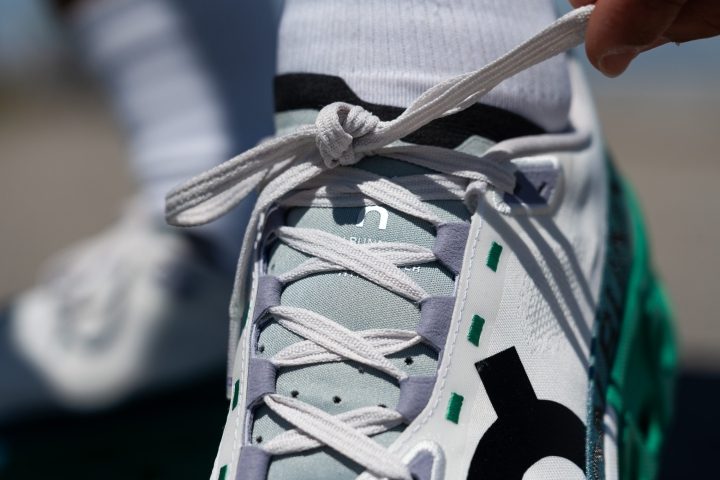
The rubberized laces feel exceptionally premium, yet that's what we expect in a £230 shoe.
Actually, the Hyper features a more substantial 2.6-mm tongue—slightly plusher yet still sleek—compared to the 1.5-mm of the Cloudmonster 2. This enhancement contributes to a more comfortable instep.
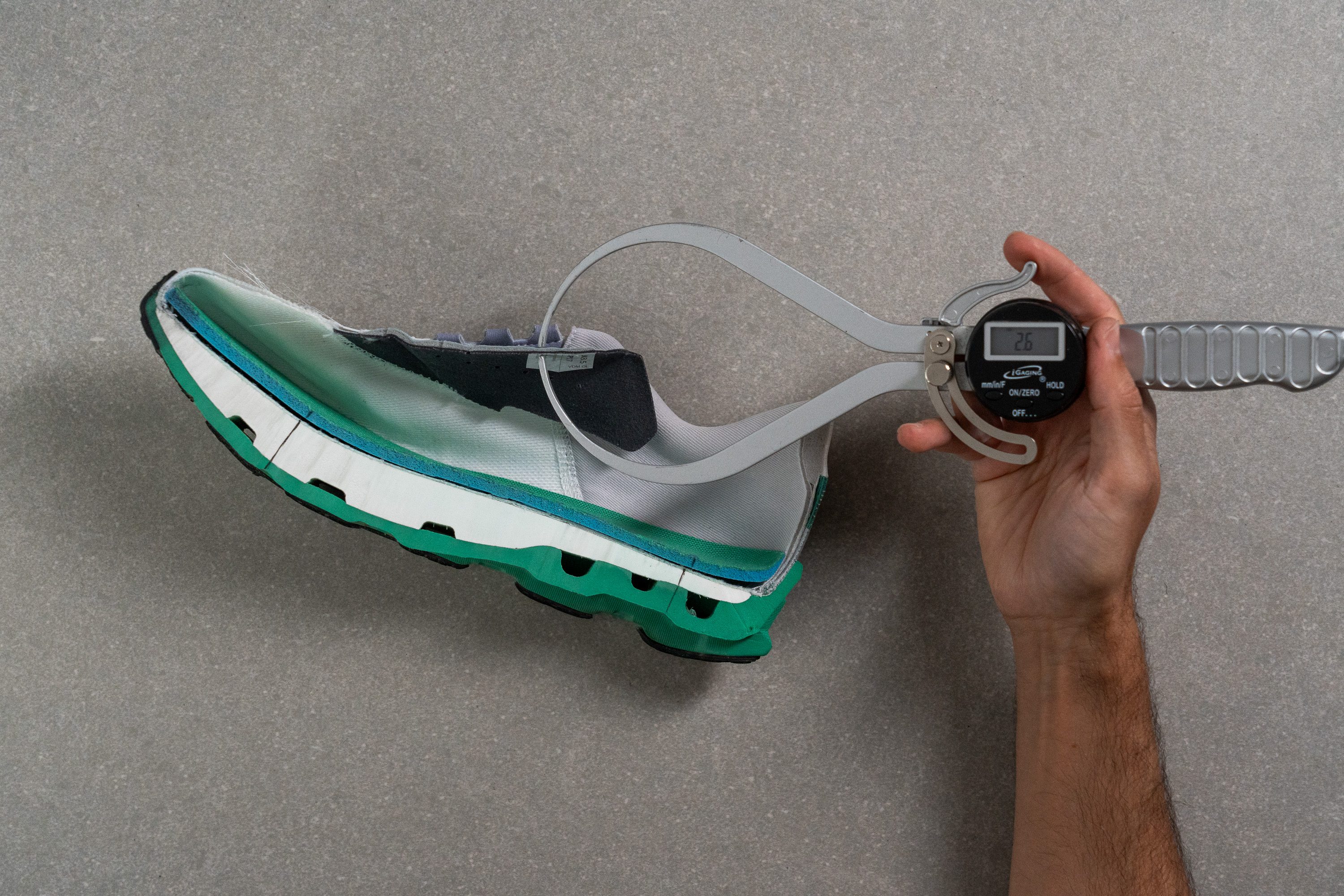
| Cloudmonster Hyper | 2.6 mm |
| Average | 5.6 mm |
Heel tab
Continuing with the design of its siblings (Cloudmonster v1 and v2), On has again decided to omit a heel tab from the Cloudmonster Hyper. This consistent feature—or lack thereof—aligns with the series’ design philosophy.
On the other hand, we found that the heel collar is taller than most shoes, which effectively secures the heel but may chafe the Achilles for those who prefer running in no-show socks.
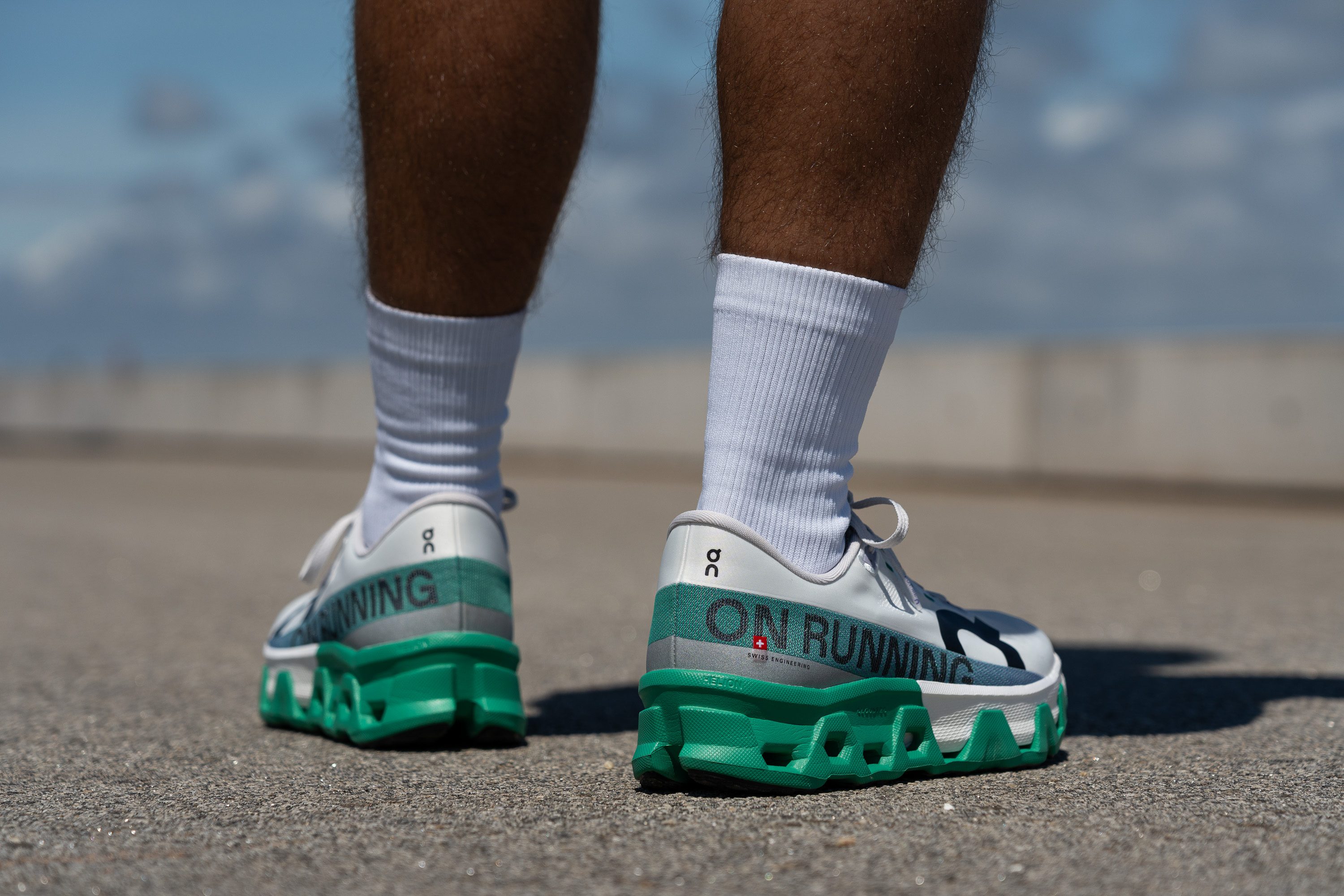
| Cloudmonster Hyper | None |
Removable insole
The insole is not glued, which is a plus, as you can swap it for third-party orthotics, especially with such a roomy upper like this one.
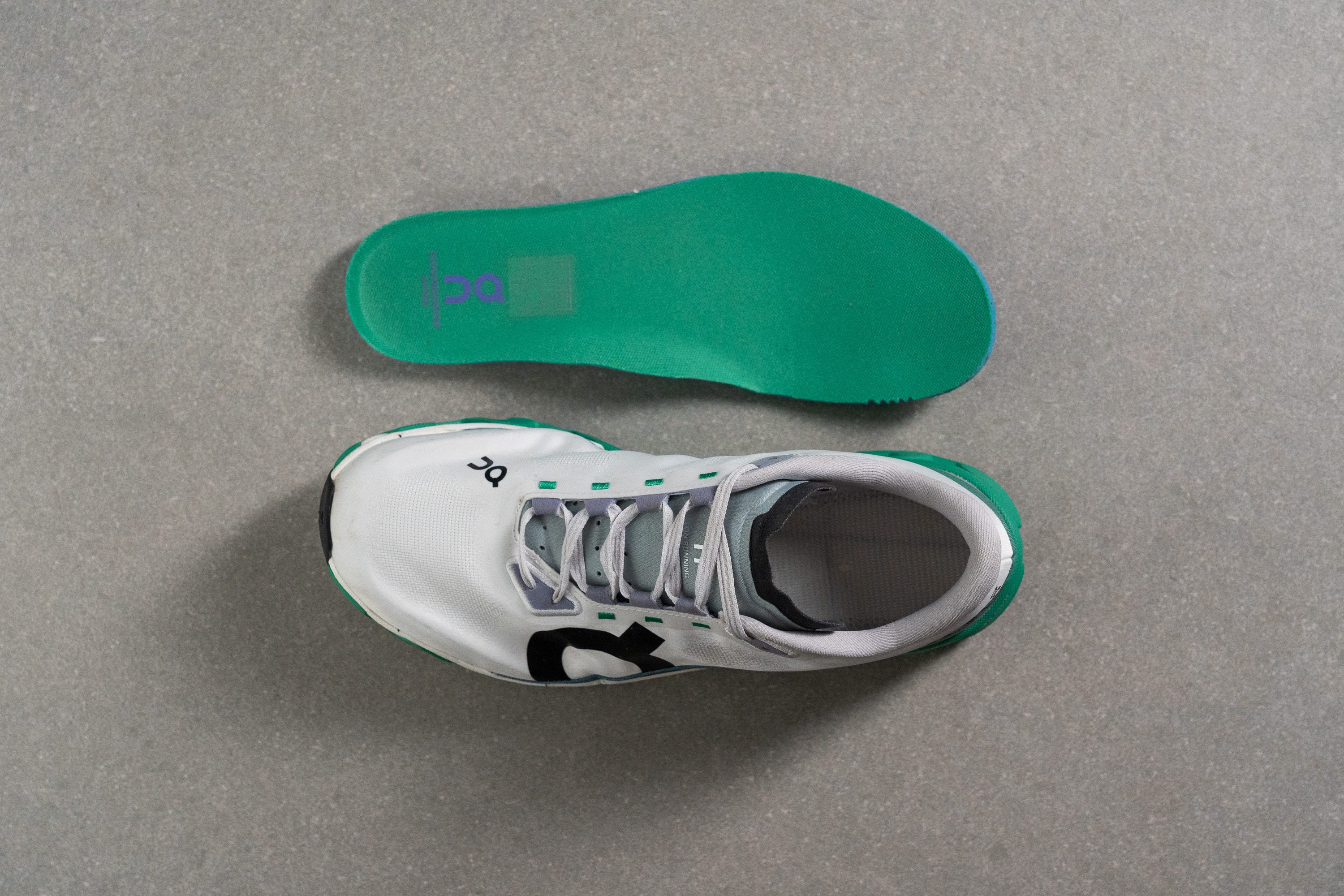
| Cloudmonster Hyper | Yes |
Misc
Reflective elements
Unfortunately, On has decided not to include reflective elements in the Cloudmonster Hyper. That's a bummer in a £230 kick.
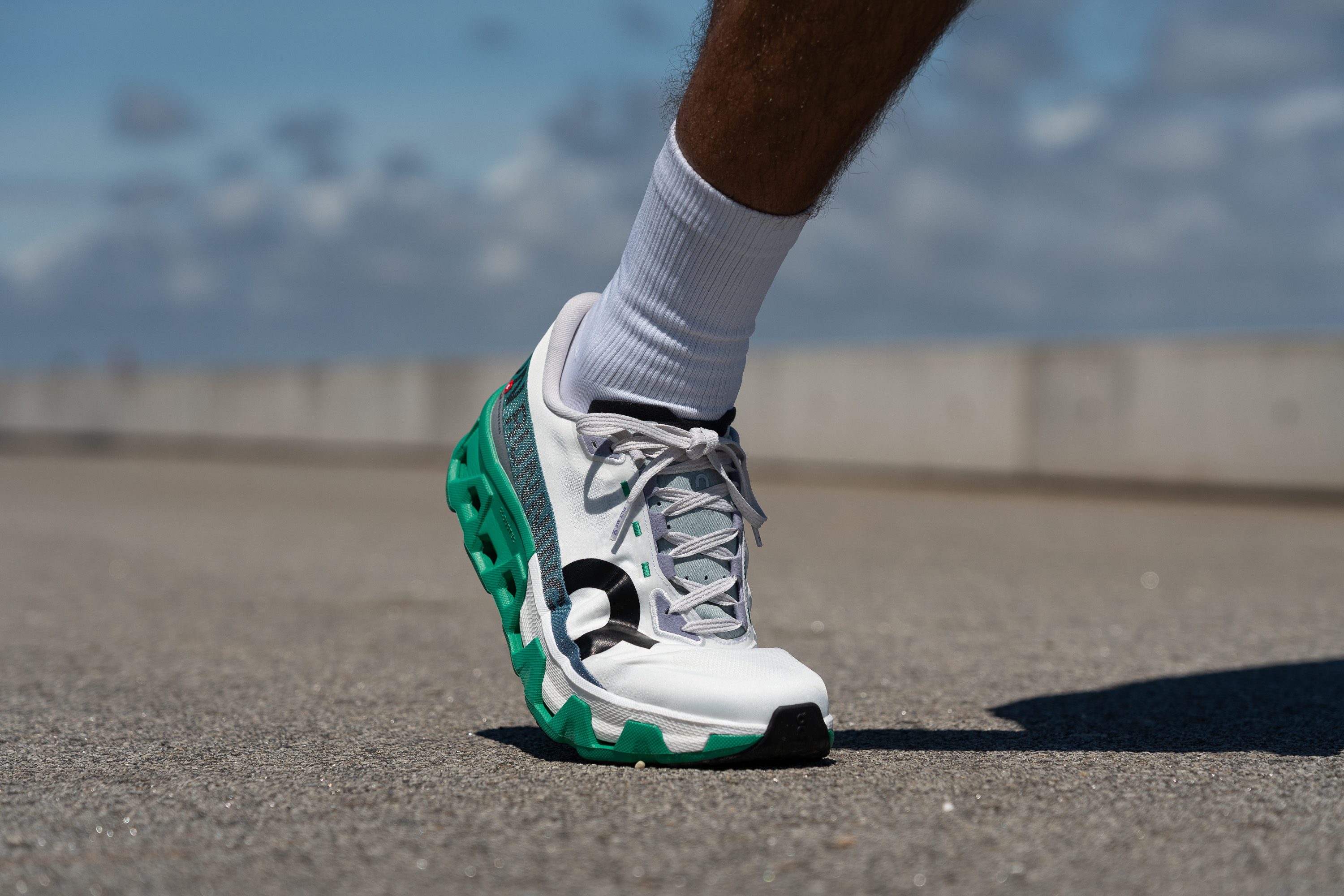
| Cloudmonster Hyper | No |

